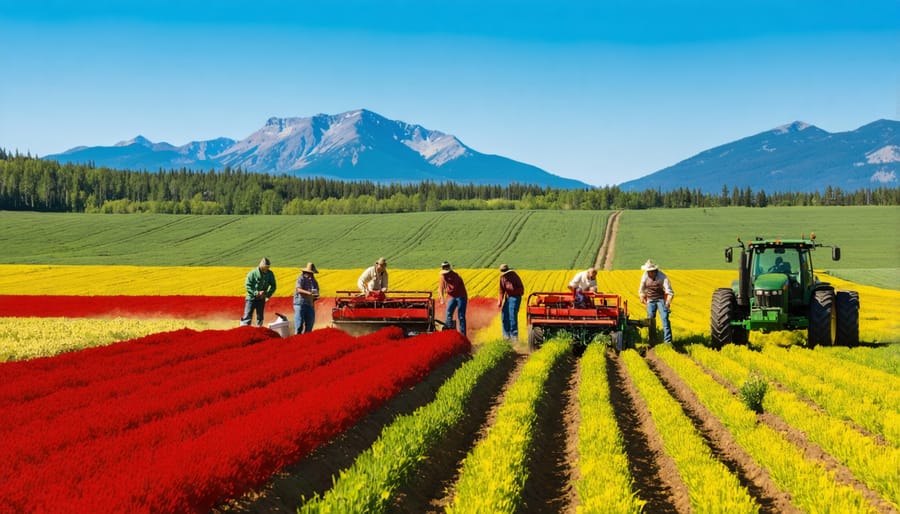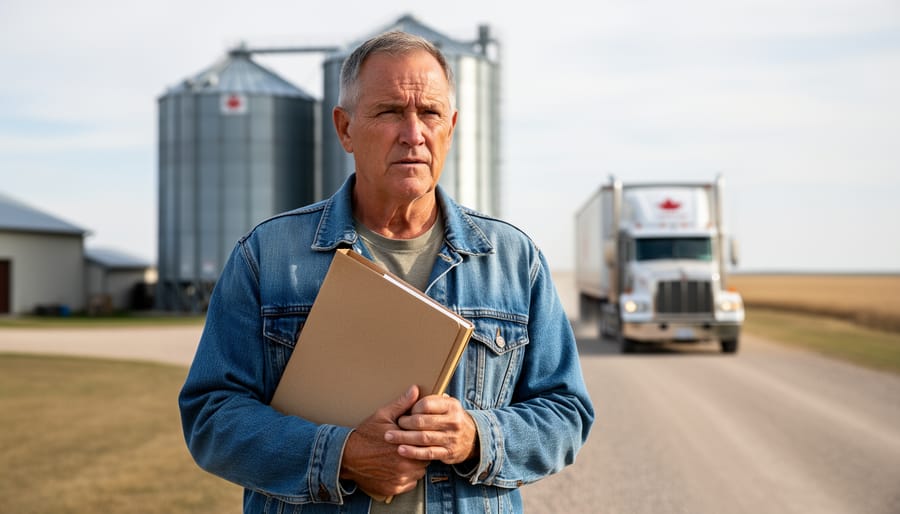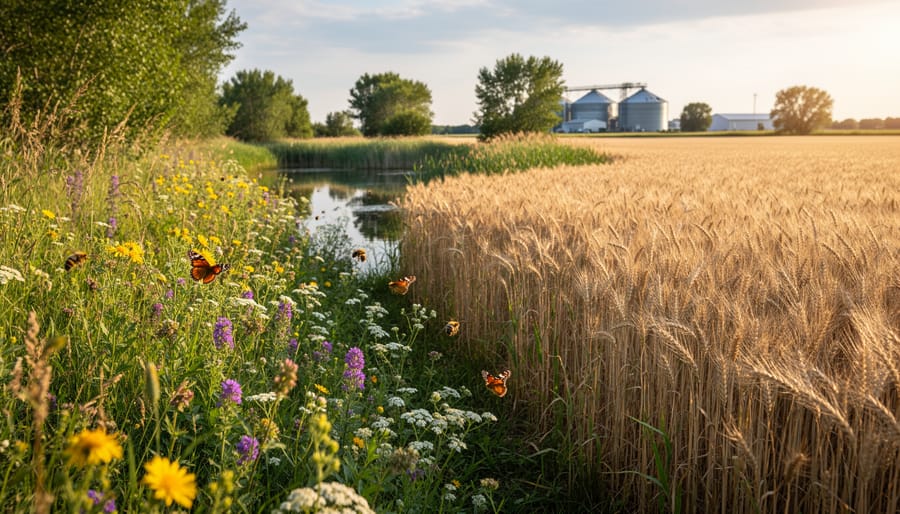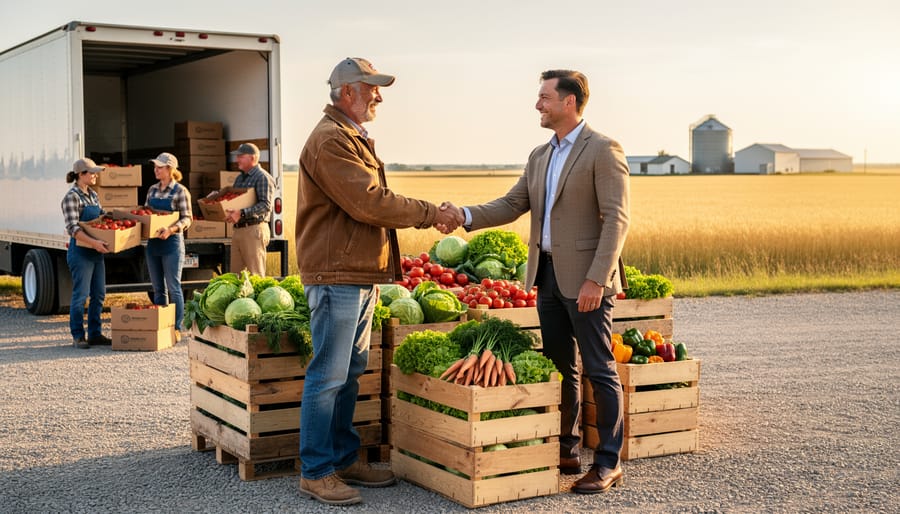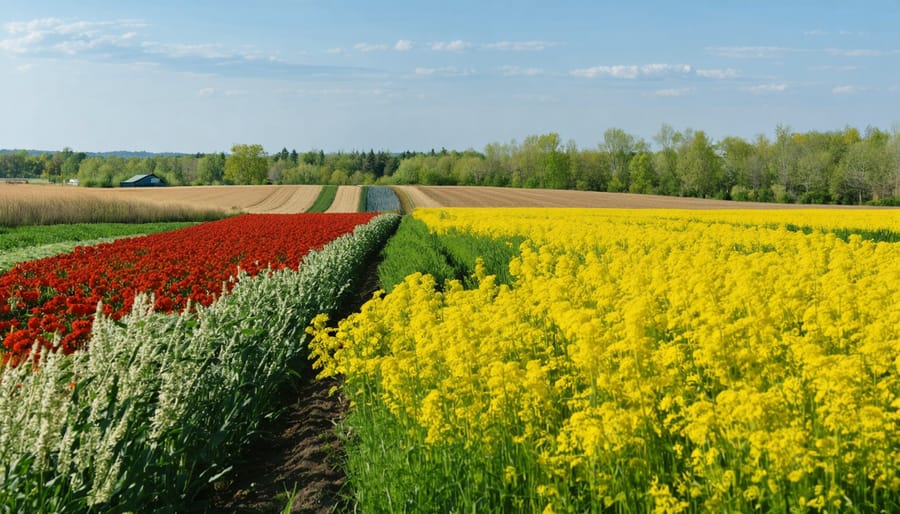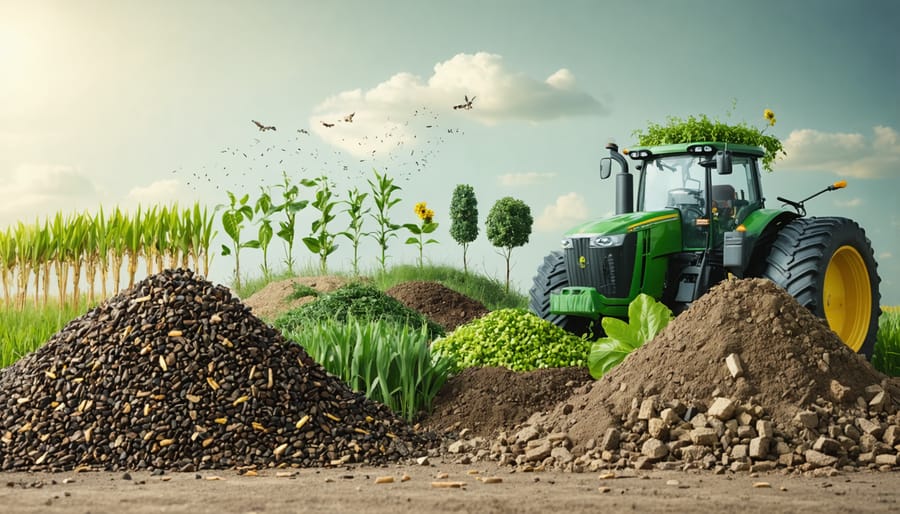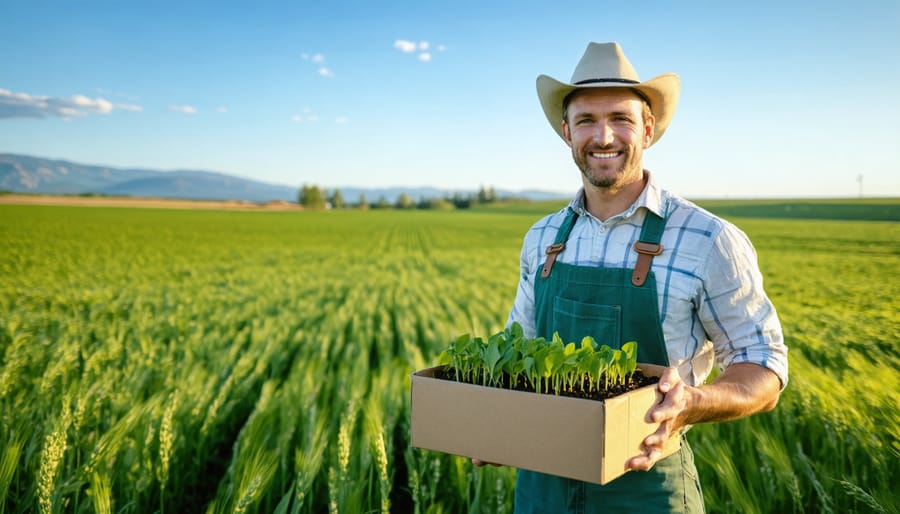Transforming sustainable agriculture demands equal access to resources, knowledge, and market opportunities for all Canadian farmers. Across Alberta’s diverse agricultural landscape, from small family farms to large operations, equitable sustainability practices aren’t just environmental imperatives—they’re economic necessities that strengthen rural communities and secure our food future.
Farm operators who implement inclusive decision-making processes see 30% higher adoption rates of sustainable practices, while operations that prioritize knowledge-sharing across cultural and socioeconomic boundaries report 25% better resource optimization. These numbers reflect a crucial truth: true sustainability only emerges when every farmer has a seat at the table.
Consider the success of the Central Alberta Farmer’s Collective, where Indigenous knowledge systems combine with modern agricultural techniques to create resilient farming practices that benefit all members equally. Their model demonstrates how equity in sustainability isn’t just about fair distribution of resources—it’s about recognizing and valuing diverse perspectives and traditional wisdom while ensuring economic viability for future generations.
As climate challenges intensify, our commitment to equitable sustainability must strengthen. By focusing on inclusive policies, accessible training programs, and fair market access, we can build an agricultural sector that’s not only environmentally sound but socially just and economically viable for all Canadian farmers.
The Social Equity Gap in Canadian Agriculture
Indigenous Communities and Land Access
Indigenous communities have long been stewards of sustainable agricultural practices, carrying generations of knowledge about land management and crop cultivation. In Alberta, several First Nations communities are leading innovative farming initiatives that combine traditional wisdom with modern sustainable practices. These projects demonstrate how indigenous land access and agricultural rights are fundamental to achieving true equity in sustainable farming.
The Treaty 7 Agricultural Partnership Program serves as an excellent example, where indigenous farmers collaborate with local agricultural organizations to develop sustainable farming enterprises. This program has successfully established several community gardens and small-scale farming operations, providing both economic opportunities and food sovereignty for participating communities.
However, challenges remain in accessing agricultural land and resources. Many indigenous communities face barriers in securing funding, accessing markets, and obtaining necessary permits. Progressive partnerships between indigenous communities and agricultural organizations are helping to address these challenges. The Alberta Indigenous Opportunities Corporation, for instance, provides financial support and technical assistance to indigenous-led agricultural projects.
By recognizing and supporting indigenous farming rights, we strengthen our collective ability to maintain sustainable agricultural practices while honoring traditional land relationships.
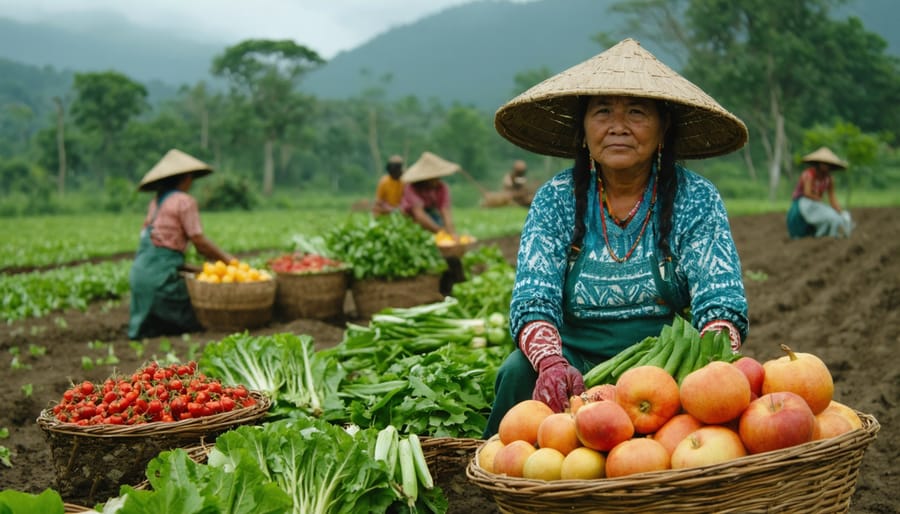
Small-Scale Farmer Challenges
Small-scale farmers in Canada face unique challenges when attempting to adopt sustainable practices. Limited access to capital often prevents investment in energy-efficient equipment or soil conservation technologies. A typical Alberta family farm might require $50,000-$100,000 to transition to sustainable methods, yet traditional lending institutions frequently hesitate to finance these initiatives.
Resource constraints extend beyond financial barriers. Many small-scale operations lack the workforce to implement labor-intensive sustainable practices while maintaining daily operations. Time management becomes particularly crucial during peak seasons, when farmers must balance immediate production needs with long-term sustainability goals.
Knowledge accessibility presents another significant hurdle. While larger operations can afford consultants and specialized training, small-scale farmers often rely on self-education and community resources. The digital divide in rural areas can further complicate access to online learning platforms and modern agricultural management tools.
Weather vulnerability and market uncertainties add additional pressure. Without substantial financial buffers, small-scale farmers face greater risks when experimenting with new sustainable methods, especially during extreme weather events that have become more frequent in recent years.
Building Equitable Supply Chain Partnerships
Fair Price Mechanisms
In today’s agricultural landscape, implementing fair pricing structures is essential for maintaining both farm viability and sustainable practices. Alberta farmers have pioneered several successful models that ensure equitable distribution of profits throughout the supply chain while supporting environmental stewardship.
One effective approach gaining traction is the cost-plus pricing model, where farmers receive a guaranteed percentage above their production costs. The Cardston County Cooperative, for instance, has implemented this system successfully, ensuring their 200+ member farms receive sustainable returns while maintaining ecological farming practices.
Profit-sharing agreements between producers and processors have also shown promising results. The Red Deer Valley Agricultural Partnership demonstrates how processors can share seasonal profits with farmers who meet specific sustainability criteria, creating a win-win situation that encourages environmental stewardship.
Price stability mechanisms, such as forward contracts with built-in sustainability premiums, help farmers invest in long-term environmental improvements without sacrificing financial security. These arrangements typically include bonuses for practices like soil carbon sequestration, water conservation, and biodiversity enhancement.
Local food networks have also emerged as effective channels for fair price implementation. Direct-to-consumer markets in Edmonton and Calgary allow farmers to capture a larger share of the food dollar while maintaining transparent pricing that reflects true production costs and environmental investments.
Collaborative Resource Sharing
Resource sharing networks have emerged as a powerful tool for promoting equity in sustainable farming across Alberta. These collaborative systems enable farmers to share everything from expensive equipment to valuable knowledge, reducing individual financial burdens while strengthening community bonds.
The Southern Alberta Equipment Share Program, for instance, allows farmers to pool resources for costly machinery like seeders and harvesters. Members can access equipment through an online booking system, paying only for usage time and maintenance costs. This approach has helped smaller operations access modern, efficient equipment they couldn’t otherwise afford.
Knowledge sharing platforms have proven equally valuable. The Alberta Farmer-to-Farmer Network connects experienced producers with those seeking guidance on sustainable practices. Through mentorship programs and regular meetups, farmers share insights about crop rotation, soil health management, and water conservation techniques.
Digital platforms are making resource sharing even more accessible. Local agricultural co-ops now use apps to coordinate equipment sharing schedules and maintain shared resource inventories. These technologies help track usage, organize maintenance, and ensure fair access for all participants.
Success stories abound, like the Lethbridge County Tool Library, where over 50 farmers share specialized sustainable farming implements. This initiative has reduced individual farm expenses by up to 40% while fostering a stronger sense of community and mutual support.
Through these collaborative approaches, Alberta farmers are demonstrating how shared resources can create more equitable and sustainable agricultural practices.
Technology Access and Digital Equity

Community Tech Hubs
The Red Deer Agricultural Innovation Centre stands as a shining example of how community tech hubs can bridge the digital divide in farming communities. Launched in 2019, this initiative provides farmers access to advanced agricultural technology and training that might otherwise be cost-prohibitive for individual operations.
The hub operates on a membership model, where local farmers can access precision farming equipment, soil testing facilities, and data analysis tools for a fraction of the purchase cost. What makes this program particularly successful is its peer-to-peer learning approach, where experienced farmers mentor others in using new technologies.
In Lethbridge, a similar program has helped over 200 small-scale farmers implement smart irrigation systems through shared resources and expertise. The hub provides regular workshops on sustainable farming practices and maintains a fleet of drone equipment that members can borrow for crop monitoring.
These initiatives demonstrate how collaborative technology sharing can make sustainable farming practices more accessible to all producers, regardless of operation size or budget. The success has inspired similar programs in Medicine Hat and Grande Prairie, creating a growing network of support for sustainable agriculture across Alberta.
Digital Training Initiatives
Digital literacy programs across Alberta are helping bridge the technology gap in sustainable farming practices. Through partnerships between agricultural extension services and tech companies, farmers can access free or low-cost training on precision agriculture tools, smart irrigation systems, and farm management software.
The Alberta Digital Farm Initiative, launched in 2022, has already trained over 500 farmers in using sustainable technology solutions. These hands-on workshops combine in-person sessions with online learning modules, making them accessible to farmers regardless of their location or previous tech experience.
Local agricultural societies have established mentorship programs where tech-savvy farmers share their knowledge with others in their community. This peer-to-peer learning approach has proven particularly effective in helping older farmers embrace new technologies while preserving traditional farming wisdom.
Mobile learning units, equipped with the latest sustainable farming technology, travel to remote communities, ensuring that geographical location doesn’t limit access to digital training. These units offer practical demonstrations and hands-on experience with soil monitoring sensors, drone technology, and precision seeding equipment.
The initiative also includes specialized support for Indigenous communities, with programs designed to integrate traditional agricultural knowledge with modern sustainable practices.
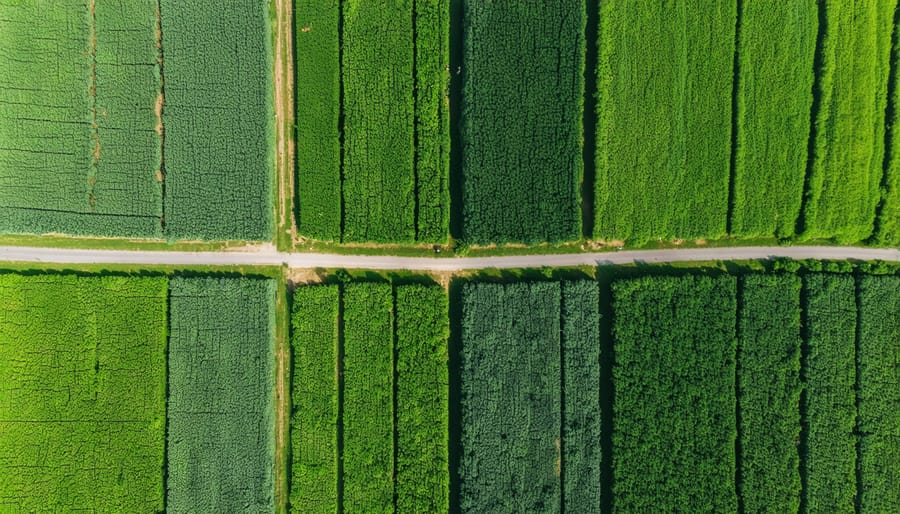
Success Stories from Alberta’s Fields
The Vanden Dool family farm near Taber stands as a shining example of how equity and sustainability can work hand in hand. After implementing circular supply chains in 2019, they’ve not only reduced their environmental footprint but also created fair-wage employment opportunities for local Indigenous workers during peak seasons.
In Leduc County, Sarah Thompson’s cooperative farming initiative has transformed 200 hectares into a model of equitable partnership. By sharing equipment and resources among five family farms, they’ve reduced individual capital costs while maintaining sustainable farming practices. Their profit-sharing model ensures everyone benefits from good harvests, with 5% of profits dedicated to training programs for aspiring young farmers.
The Mountain View Hutterite Colony near Strathmore demonstrates how traditional community values can align with modern sustainable practices. Their integrated livestock and crop operation employs advanced water conservation techniques while providing stable employment for 45 community members. Their mentorship program has helped three neighboring farms transition to sustainable practices while maintaining profitable operations.
Near Red Deer, the Singh Family Farms partnership showcases successful integration of new Canadians into Alberta’s agricultural sector. Their 150-hectare operation combines traditional Punjab farming wisdom with modern Canadian agricultural practices. They’ve created a training program that has helped 12 immigrant families establish their own sustainable farming operations in the region.
The Rocky View Agricultural Society’s equipment-sharing program has enabled smaller-scale farmers to access expensive sustainable farming technology. This initiative has helped 30 family farms implement precision agriculture practices, reducing input costs by an average of 25% while improving soil health and water conservation.
These success stories share common elements: community collaboration, fair resource distribution, and a commitment to both environmental and social sustainability. They prove that when equity is prioritized alongside environmental concerns, agricultural operations can thrive while building stronger, more resilient communities. The ripple effects extend beyond individual farms, creating lasting positive impact throughout Alberta’s agricultural sector.
As we’ve explored throughout this article, implementing equitable sustainability practices in Canadian agriculture isn’t just about environmental stewardship – it’s about creating a fair and prosperous future for all members of our farming community. By embracing inclusive decision-making processes and ensuring that sustainability initiatives benefit everyone, from small family farms to larger operations, we can build a more resilient agricultural sector in Alberta and beyond.
The key to success lies in taking actionable steps: start by conducting thorough assessments of your current practices, identifying areas where both environmental and social improvements can be made. Consider forming partnerships with neighboring farms to share resources and knowledge, particularly when implementing new sustainable technologies or practices.
Remember that equity in sustainability means ensuring all voices are heard – including those of farm workers, Indigenous communities, and younger generations of farmers. Establish regular community meetings to discuss sustainability initiatives and their impacts. Document your progress and share success stories to inspire others in your region.
Moving forward, focus on these practical actions:
– Develop transparent communication channels with all stakeholders
– Create mentorship programs pairing experienced sustainable farmers with newcomers
– Implement fair labor practices alongside environmental initiatives
– Regularly evaluate and adjust your sustainability programs based on community feedback
By working together and maintaining a commitment to both environmental and social equity, we can create a sustainable agricultural future that truly works for everyone in our farming community.

